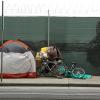0
Policy Brief
Community:
Dec 4, 2019

In California, more than 3.7 million students were eligible for free or reduced priced school meals in the 2017-2018 school year. For many of those students, school meals are the primary source of regular access to healthy food. When the bell rings at 3:00 or lets out for summer break, many of those students go home to nutritional uncertainty or high-calorie, low-nutrient foods.
For many low-income families, the out-of-school-time food access gap increases family stress: limited budgets are stretched further to cover food, rent, utilities, transportation, medications, and chidcare costs. For very young children, food insecurity can negatively impact brain and physical development. For children of all ages, disrupted access to healthy food can impact behavior, increase risk of obesity, make it harder to concentrate, or exacerbate existing healthy conditions like type 2 diabetes. The impact is not limited to summer, and can lead to a rocky start to the school year, negatively impacting school attendance and students’ ability to effectively participate in school.
Read the full brief to learn how public and affordable housing communities can address food insecurity for children and youth with the help of out-of-school-time USDA child nutrition programs.
Authored by:
Topics: Advocacy, Early childhood, Food insecurity, Health, Healthy homes, Housing, Legislation & Policy, Low-income, Nutrition, Out-of-school time, West Coast, Youth
 Shared by Linda Lu
Shared by Linda Lu
Linda Lu posted a
on Dec 4, 2019
In California, more than 3.7 million students were eligible for free or reduced priced school meals in the 2017-2018 school year. For many of those students, school meals are the primary source of regular access to healthy food.
0
Report
Community:
Dec 7, 2018
This report examines health services use and population dynamics among the aging homeless population in Los Angeles. Evidence suggests that adverse health outcomes lead to homelessness, and the conditions related to homelessness lead to or exacerbate a range of health problems
Authored by: Dennis Culhane, Steve Metraux, and Randall Kuhn for Actionable Intelligence for Social Policy
Topics: Health, Homelessness, Housing, Low-income, Research, West Coast
 Shared by Housing Is
Shared by Housing Is
Housing Is posted a
on Apr 11, 2019
Dennis Culhane, Steve Metraux, and Randall Kuhn for Actionable Intelligence for Social Policy
This report examines health services use and population dynamics among the aging homeless population in Los Angeles. Evidence suggests that adverse health outcomes lead to homelessness, and the conditions related to homelessness lead to or exacerbate a range of health problems
0
News Article
Community:
Mar 12, 2019
Kaiser is investing $200 million in low-interest loans for affordable housing nationwide. This may be part of a growing national trend of health maintenance organizations investing in housing to improve community health. In Phoenix, United Healthcare lent money to a community development corporation, Chicanos Por La Causa, to purchase apartment complexes for Medicaid recipients. In Chicago, the University of Illinois Hospital helps to find permanent housing for homeless people who regularly present at its emergency department.
Authored by: Raquel Maria Dillon for Market Place
Topics: Affordable Care Act, Community development, Health, Homelessness, Housing, Low-income, Partnerships, West Coast
 Shared by Mica O'Brien
Shared by Mica O'Brien
Mica O'Brien posted a
on Mar 14, 2019
Raquel Maria Dillon for Market Place
Kaiser is investing $200 million in low-interest loans for affordable housing nationwide. This may be part of a growing national trend of health maintenance organizations investing in housing to improve community health.
0
News Article
Community:
Mar 8, 2019
Typhus, tuberculosis, and other illnesses are spreading quickly through camps and shelters.
Authored by: Anna Gorman and Kaiser Health News for The Atlantic
Topics: Health, Homelessness, Housing, Low-income, West Coast
 Shared by Housing Is
Shared by Housing Is
Housing Is posted a
on Mar 8, 2019
Anna Gorman and Kaiser Health News for The Atlantic
Typhus, tuberculosis, and other illnesses are spreading quickly through camps and shelters.
0
News Article
Community:
Jan 24, 2019
A new collaboration of San Francisco Bay Area foundations and businesses is raising $540 million to tackle the region’s affordable housing crisis.
Authored by: Affordable Housing Finance
Topics: Community development, Health, Housing, Low-income, Partnerships, Supportive housing, West Coast
 Shared by Housing Is
Shared by Housing Is
Housing Is posted a
on Jan 28, 2019
Affordable Housing Finance
A new collaboration of San Francisco Bay Area foundations and businesses is raising $540 million to tackle the region’s affordable housing crisis.
0
Webinar
Community:
Oct 8, 2018
During this All In webinar, Caroline Fichtenberg of SIREN reviewed the current landscape of assessment tools and outcomes measures for social needs. Karis Grounds of 2-1-1 San Diego explained how they incorporated social needs assessment into their Risk Rating Scale, which helps them better serve clients while showing the impact of their services.
Authored by: All In: Data for Community Health
Topics: Data sharing, Health, Low-income, Metrics, Partnerships, West Coast
 Shared by Mica O'Brien
Shared by Mica O'Brien
Mica O'Brien posted a
on Oct 10, 2018
All In: Data for Community Health
During this All In webinar, Caroline Fichtenberg of SIREN reviewed the current landscape of assessment tools and outcomes measures for social needs.
1
News Article
Community:
Sep 11, 2018
San Francisco health officials working to end HIV infections and deaths in The City are zeroing in on the homeless population, where there’s been an uptick in new cases.
Authored by: Joshua Sabatini for
Topics: Health, Homelessness, Legislation & Policy, Low-income, Preventative care, West Coast
 Shared by Mica O'Brien
Shared by Mica O'Brien
Mica O'Brien posted a
on Sep 18, 2018
San Francisco health officials working to end HIV infections and deaths in The City are zeroing in on the homeless population, where there’s been an uptick in new cases.
0
Policy Brief
Community:
Jul 17, 2018
The Denver Social Impact Bond program is an initiative aimed at measurably improving the lives of people most in need by driving resources towards better, more effective programs. Social Impact Bonds are a unique type of performance-based contract where private and/or philanthropic lenders loan funds to accomplish a specific objective and are repaid based on whether the program achieves its goals. Denver’s Social Impact Bond program will use funds from lenders to provide housing and supportive case management services to at least 250 homeless individuals who frequently use the city’s emergency services, including police, jail, the courts and emergency rooms.
Authored by:
Topics: Community development, Cost effectiveness, Criminal justice, Health, Homelessness, Housing, Low-income, Mental health, Partnerships, Stability, Substance abuse, West Coast
 Shared by Housing Is
Shared by Housing Is
Housing Is posted a
on Jul 17, 2018
The Denver Social Impact Bond program is an initiative aimed at measurably improving the lives of people most in need by driving resources towards better, more effective programs.
0
Publication
Community:
Jul 13, 2018
This fact sheet describes how a landlord may legally prohibit smoking in common spaces and individual units, and explains how to implement a smokefree policy in compliance with the rent control law, where applicable. It also includes options for addressing possible enforcement and compliance issues that may arise once a policy is in place.
Authored by:
Topics: Family engagement, Health, Housing, Low-income, Smoke-free, West Coast
 Shared by Housing Is
Shared by Housing Is
Housing Is posted a
on Jul 13, 2018
This fact sheet describes how a landlord may legally prohibit smoking in common spaces and individual units, and explains how to implement a smokefree policy in compliance with the rent control law, where applicable.
0
News Article
Community:
Aug 1, 2016
Boulder County, Colo., pioneered the movement. What can others learn from their experience?
Authored by: Mattie Quinn for Governing the State and Localities
Topics: Cost effectiveness, Data sharing, Dual-eligibles, Food insecurity, Health, Homelessness, Housing, Legislation & Policy, Low-income, Medicaid / Medicare, Partnerships, Place-based, Supportive housing, West Coast
 Shared by Housing Is
Shared by Housing Is
Housing Is posted a
on Jul 5, 2018
Mattie Quinn for Governing the State and Localities
Boulder County, Colo., pioneered the movement. What can others learn from their experience?


 Shared by Linda Lu
on Dec 4, 2019
Shared by Linda Lu
on Dec 4, 2019

 Shared by Housing Is
on Apr 11, 2019
Shared by Housing Is
on Apr 11, 2019



 Shared by Housing Is
on Mar 8, 2019
Shared by Housing Is
on Mar 8, 2019

 Shared by Housing Is
on Jan 28, 2019
Shared by Housing Is
on Jan 28, 2019


 Shared by Housing Is
on Jul 17, 2018
Shared by Housing Is
on Jul 17, 2018
 Shared by Housing Is
on Jul 13, 2018
Shared by Housing Is
on Jul 13, 2018
 Shared by Housing Is
on Jul 5, 2018
Shared by Housing Is
on Jul 5, 2018